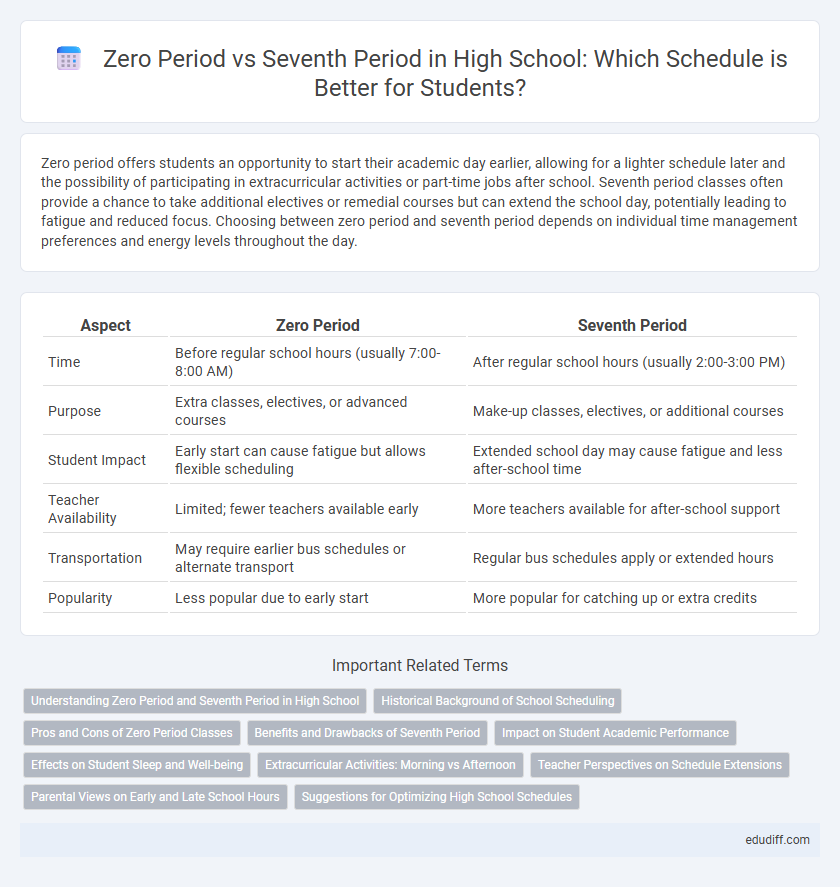Zero period offers students an opportunity to start their academic day earlier, allowing for a lighter schedule later and the possibility of participating in extracurricular activities or part-time jobs after school. Seventh period classes often provide a chance to take additional electives or remedial courses but can extend the school day, potentially leading to fatigue and reduced focus. Choosing between zero period and seventh period depends on individual time management preferences and energy levels throughout the day.
Table of Comparison
| Aspect | Zero Period | Seventh Period |
|---|---|---|
| Time | Before regular school hours (usually 7:00-8:00 AM) | After regular school hours (usually 2:00-3:00 PM) |
| Purpose | Extra classes, electives, or advanced courses | Make-up classes, electives, or additional courses |
| Student Impact | Early start can cause fatigue but allows flexible scheduling | Extended school day may cause fatigue and less after-school time |
| Teacher Availability | Limited; fewer teachers available early | More teachers available for after-school support |
| Transportation | May require earlier bus schedules or alternate transport | Regular bus schedules apply or extended hours |
| Popularity | Less popular due to early start | More popular for catching up or extra credits |
Understanding Zero Period and Seventh Period in High School
Zero period in high school refers to an early morning class scheduled before the regular school day begins, often starting around 7:00 AM, allowing students to complete an extra course or relieve their regular day schedule. Seventh period typically represents the final class of the standard school day, usually held in the afternoon, providing students with completion of their daily academic requirements. Both periods offer flexible scheduling options to accommodate different student needs and course availability.
Historical Background of School Scheduling
Early American high schools originally adopted a traditional six-period day, with zero period emerging in the mid-20th century to accommodate extracurricular activities and provide academic flexibility. Seventh period was later introduced as schools expanded, aiming to maximize instructional time and offer more course options. Both scheduling models reflect evolving educational priorities shaped by societal demands and student needs.
Pros and Cons of Zero Period Classes
Zero period classes offer students the advantage of freeing up their afternoon schedule and providing opportunities for extra electives or extracurricular activities. However, attending school earlier in the morning can lead to increased fatigue and potential conflicts with students' natural sleep cycles. While seventh period allows for a traditional end-of-day schedule, zero period demands early wake-up times that may impact overall academic performance and well-being.
Benefits and Drawbacks of Seventh Period
Seventh period offers students extra time for elective courses, tutoring, or extracurricular activities, enhancing academic flexibility and skill development. However, attending seventh period can lead to fatigue, as it extends the school day, potentially impacting student focus and performance in later classes. This period benefits students needing credit recovery or advanced coursework but may reduce time for after-school jobs or family commitments.
Impact on Student Academic Performance
Zero period classes often provide students with more focused morning hours, which can enhance concentration and improve performance in core subjects by leveraging higher cognitive alertness at the start of the day. Seventh period classes, typically held later in the afternoon, may coincide with student fatigue, potentially diminishing academic engagement and retention of material. Research indicates that students attending zero period consistently achieve higher grades and standardized test scores compared to their counterparts in seventh period, highlighting the positive impact of time-of-day on learning outcomes.
Effects on Student Sleep and Well-being
Zero period classes often lead to earlier wake-up times, reducing students' overall sleep duration and negatively impacting their well-being. In contrast, seventh period classes allow for a more traditional school schedule, potentially supporting better sleep hygiene and mental health. Research indicates that adequate sleep, facilitated by later start times, improves cognitive function, mood, and academic performance among high school students.
Extracurricular Activities: Morning vs Afternoon
Zero period classes offer students the opportunity to engage in extracurricular activities later in the school day, providing flexibility for sports, clubs, and arts programs typically scheduled after school hours. Seventh period often conflicts with extracurricular practices and meetings, limiting students' participation and reducing involvement in activities that enhance social skills and college applications. Schools with zero period options see higher student involvement in after-school programs due to less scheduling overlap compared to those relying solely on seventh period scheduling.
Teacher Perspectives on Schedule Extensions
Teachers often view zero period as a valuable opportunity for focused instruction with smaller class sizes, enhancing student engagement and learning outcomes. Conversely, seventh period can extend the school day but may lead to increased teacher fatigue and reduced instructional effectiveness due to accumulated daily workload. Educators emphasize that schedule extensions like zero or seventh periods must balance academic benefits with teacher well-being to sustain quality teaching.
Parental Views on Early and Late School Hours
Parents often prefer zero period classes for their children because these early morning sessions allow more time after school for extracurricular activities and family interaction. Concerns about seventh period typically include students' fatigue and reduced focus due to the long school day, potentially impacting homework and evening routines. Surveys indicate that parental support for zero period correlates with a desire for balanced schedules, promoting academic achievement while preserving personal time.
Suggestions for Optimizing High School Schedules
Allocating zero period for focused academic enrichment or advanced coursework can enhance student learning without extending the school day excessively. Seventh period offers flexibility for electives, tutoring, or extracurricular activities, promoting a balanced schedule that supports both academic and personal development. Schools should analyze student performance data and survey preferences to optimize the balance between zero and seventh periods, ensuring maximal engagement and reduced burnout.
Zero period vs Seventh period Infographic

 edudiff.com
edudiff.com